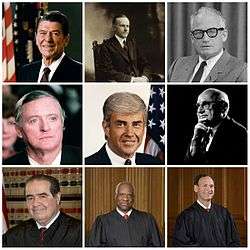Black conservatism in the United States
Black conservatism in the United States is a political and social movement rooted in communities of African descent that aligns largely with the American conservative movement. Since the Civil Rights Movement, the black community has generally fallen on the left of the political spectrum, and has predominantly favored itself on the side of liberalism and civil rights progressives. Black conservatism emphasizes traditionalism, patriotism, capitalism, free markets, and sometimes social conservatism.
Overview
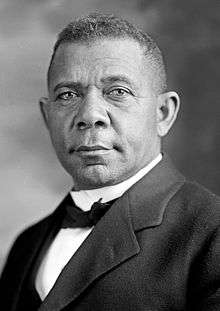
Beliefs
One of the main characteristics of black conservatism is its emphasis on personal choice and responsibilities above socioeconomic status and institutional racism. In the tradition of African American politics and intellectual life, black conservatives tend to side with Booker T. Washington as contrasted with W. E. B. Du Bois.[1] For many black conservatives, the key mission is to bring repair and success to the Black community by applying the following fundamental principles:
- The pursuit of educational and professional excellence as a means of advancement within the society;
- Policies that promote safety and security in the community beyond the typical casting of a criminal as a "victim" of societal racism;
- Not using the lens of race and the country's history of discrimination as justifications for not excelling to the best of your abilities;
- Local economic development through free enterprise rather than looking to the federal government for assistance;
- Empowerment of the individual via self-improvement (virtue), conscience, and supernatural grace.[2]
Black conservatives may find common ground with black nationalists through their common belief in black empowerment and the theory that black people have been duped by the welfare state.
On the other hand, some of the policies advocated by Black conservatives are in conflict with some of the key points in the common social, economic, and political positions that a high percentage of African-Americans favor. For example, black conservatives typically oppose affirmative action, which is supported by the vast majority of African American communities. They tend to argue that efforts to obtain reparations for slavery are either misguided or counter-productive. Black conservatives tend to be self-critical of aspects of African-American culture which has created poverty and dependency.[3] Moreover, black conservatives – especially black Republicans – are often accused of being Uncle Toms. Ebony in their May 2001 "100+ Most Influential Black Americans" issue, did not include a number of influential African Americans such as Thomas Sowell, Shelby Steele, Armstrong Williams, Walter Williams and, most notably, Supreme Court Justice Clarence Thomas. The Economist described the exclusion of Justice Thomas from the list as spiteful.[4] Black conservatives favor integration of African Americans into mainstream America and, consequently, disagree with black nationalism and separatism. Black conservatives are more inclined to support economic policies promoting globalization, free trade and tax cuts.
According to a 2004 study, 13.7% of blacks identified as "Conservative" or "Extremely Conservative"[5] with another 14.4% identifying as slightly conservative. However, the same study indicated less than ten percent identified as Republican or Republican leaning in any fashion. Likewise, a 2007 Pew Research Center survey showed that 19% of blacks identify as Religious Right.[6] In 2004, the Pew Research Center indicated only 7% of blacks identify as Republican.[7]
The National Election Pool poll showed that support for Proposition 8 was strong amongst African American voters, interviewed in the exit poll with 70% in favor, more than any other racial group.[8] Their support was considered crucial to the proposition's passing, since African Americans made up an unusually larger percentage of voters that year, due to the presence of Barack Obama on the ballot.[9] Polls by both the Associated Press and CNN mirrored this data, reporting support among black voters to be at 70%[10] and 75%,[11] respectively.
Historical basis
From Reconstruction up until the New Deal, the black population tended to vote Republican as the Republican Party, particularly in the Southern United States, was seen as more racially liberal than the Democratic Party, primarily because of the role of the southern wing of the Democratic Party as the party of racial segregation and the Republican Party's roots in the abolitionist movement (see Dixiecrats). Blacks started to shift in significant numbers to the Democrats with the election of Franklin D. Roosevelt,[12] whose New Deal particularly benefited economically disadvantaged minority communities and helped forge the New Deal coalition which dominated American politics for the next 30 years, and continued with the election of John F. Kennedy. This shift was also influenced by Herbert Hoover's practice of firing loyal African-Americans from positions within the Republican Party, in order to increase his appeal to Southern white voters.[13] This can be considered an early example of a set of Republican Party methods that were later termed the Southern Strategy.
Religion
Another case study of differences between Black conservatives and Black Republicans is an emphasis on personal empowerment versus theological perspectives. Black Republicans like Colin Powell hold to the social ideas articulated by the early Radical Republicans like Frederick Douglass while at the same time supporting the self-empowerment message of Booker T. Washington. Many social conservatives who are black and Republican hold to a biblically based empowerment although they also appreciate Booker's emphasis on personal accomplishment. Conservatives like the Texas minister T. D. Jakes are evangelical African Americans who support policies more in common but not totally in line with many white Evangelicals.
The African-American church has traditionally been an important element of social and political movements in the Black community. These generally have been identified with persons of the Left or liberalism, like Jesse Jackson, but this is not always true. On issues concerning homosexuality, Black Protestants are more socially conservative than other groups, excepting White Evangelicals.[14] Their view on the issue of homosexual teachers changed less than any other segment based on religion or race.
Timeline of events
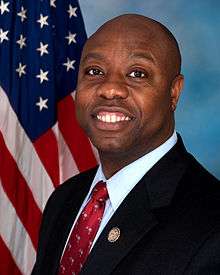
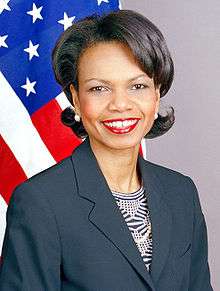
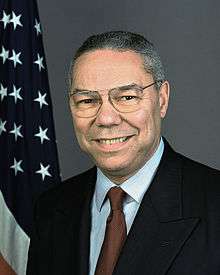
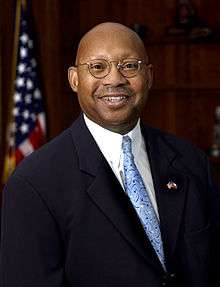
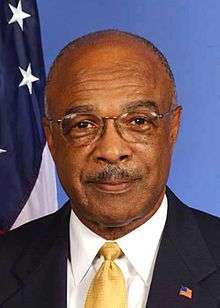
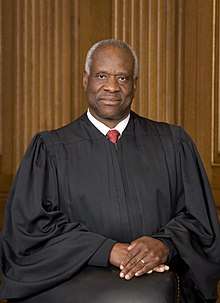

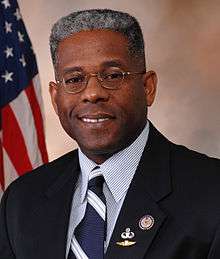
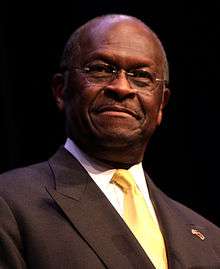
This is a timeline of significant events in African American history which have shaped the conservative movement in the United States.
- 1950s
- 1954 – President Dwight Eisenhower appoints the following:
- Archie Alexander as Governor of the U.S. Virgin Islands
- J. Ernest Wilkins Sr. as Undersecretary of Labor for International Labor Affairs
- E. Frederic Morrow as Administrative Officer for Special Projects
- 1960s
- 1970s
- 1975 – President Gerald Ford appoints the following:
- William T. Coleman as Secretary of Transportation
- James B. Parsons is named Chief Judge of the US District Court in Chicago
- 1979 – Melvin H. Evans is elected to US Congress (Virgin Islands)
- 1980s
- 1980 – NAACP President Benjamin Hooks is invited to address the Republican National Convention
- 1981 – President Ronald Reagan appoints the following:
- Clarence Pendleton, Jr. as Chairman of the US Civil Rights Commission
- Samuel Pierce as United States Secretary of Housing and Urban Development
- 1982 – President Reagan appoints Clarence Thomas as Chairman of the Equal Employment Opportunity Commission.
- 1985 – President Reagan appoints Alan Keyes the Assistant Secretary of State for International Organization Affairs.
- 1987 – President Reagan appoints Colin L. Powell the National Security Advisor.
- 1989 – President George H. W. Bush appoints the following:
- Louis Wade Sullivan as United States Secretary of Health and Human Services
- General Colin L. Powell as Chairman of the Joint Chiefs of Staff
- Condoleezza Rice as Senior Director of the National Security Council for Soviet and East European Affairs
- Constance Berry Newman as Director of United States Office of Personnel Management
- Vernon Parker as Special Assistant to the President on the White House Staff
- 1990s
- 1990 – Arthur Fletcher is appointed as the Chairman of the United States Commission on Civil Rights
- 1991 – Gary Franks (CT) is elected to US Congress
- 1991 – President George H. W. Bush appoints Clarence Thomas to U.S. Supreme Court
- 1993 – President George H. W. Bush appoints John W. Shannon as United States Under Secretary of the Army
- 1994 – Victoria Buckley elected as Secretary of State of Colorado
- 1995 – J. C. Watts (OK) elected to US Congress
- 1998 – U.S. House of Representatives elects J. C. Watts (R-OK) to be Chairman of the House Republican Conference.
- DeForest Soaries appointed as Secretary of State of New Jersey
- 1999 – Ken Blackwell elected as the Ohio Secretary of State
- Joe Rogers elected as the Lieutenant Governor of Colorado
- 2000s
- 2001 – President George W. Bush appoints the following:
- General Colin Powell as the United States Secretary of State
- Roderick R. Paige as the United States Secretary of Education
- Condoleezza Rice as Advisor of the National Security Council
- Alphonso Jackson as the Deputy Secretary to Housing and Urban Development
- Claude Allen as the Deputy Secretary of Health and Human Services
- Leo S. Mackay, Jr. as the Deputy Secretary of Veterans Affairs
- Larry D. Thompson as the United States Deputy Attorney General
- Michael Powell as the Chairman of the Federal Communications Commission
- Stephen A. Perry as Administrator of General Services Administration
- Kay Coles James as Director of United States Office of Personnel Management
- Charles E. James, Sr. as Director of Federal Contract Compliance
- Ruth A. Davis as Director General of the Foreign Service
- Reginald J. Brown as Assistant Secretary of the Army (Manpower and Reserve Affairs)
- Brigadier General Francis X. Taylor as Coordinator for Counterterrorism
- Eric M. Bost as Under Secretary of Agriculture for Food, Nutrition, and Consumer Services
- Brian C. Roseboro as Assistant Secretary of the Treasury for Financial Markets
- Dr. Eric Motley as Deputy Associate Director, Office of Presidential Personnel
- Pierre-Richard Prosper as United States Ambassador-at-Large for War Crimes Issues
- Andrea Barthwell as Deputy Director for Demand Reduction at the Office of National Drug Control Policy
- Randy Daniels, Secretary of State of New York joins the GOP.
- 2002 – President George W. Bush appoints the following:
- Major General Claude M. Bolton, Jr. as United States Assistant Secretary of the Army for Acquisition, Logistics, and Technology
- Lynn Swann as Chairman of the President's Council on Physical Fitness and Sports
- Brigadier General Francis X. Taylor as Assistant Secretary of State for Diplomatic Security
- Ron Christie as Special Assistant to the President
- 2003 – President George W. Bush appoints the following:
- Clark Ervin as Inspector General of the United States Department of Homeland Security
- Vernon Parker as Assistant Secretary of Agriculture for Civil Rights
- Michael Steele elected as Lieutenant Governor of Maryland
- Jennette Bradley elected as Lieutenant Governor of Ohio
- Michael Steele elected as Lieutenant Governor of Maryland
- 2004 – President George W. Bush appoints the following:
- Alphonso Jackson as United States Secretary of Housing and Urban Development
- Gerald A. Reynolds as Chairman of the United States Commission on Civil Rights
- Constance Berry Newman as Assistant Secretary of State for African Affairs
- Brian C. Roseboro as Under Secretary of the Treasury for Domestic Finance
- 2005 – President George W. Bush appoints the following:
- Condoleezza Rice as United States Secretary of State
- Claude Allen as Director of the Domestic Policy Council
- Admiral John O. Agwunobi as United States Assistant Secretary for Health
- Jendayi Frazer as Assistant Secretary of State for African Affairs
- B. J. Penn as Assistant Secretary of the Navy (Installation and Environment)
- Randy Brock elected as Vermont Auditor of Accounts
- Jennette Bradley is appointed Ohio State Treasurer
- Randy Brock elected as Vermont Auditor of Accounts
- 2006 – President George W. Bush appoints the following:
- Lurita Doan as Administrator of the U.S. General Services Administration
- Ronald J. James as Assistant Secretary of the Army (Manpower and Reserve Affairs)
- Naomi C. Earp as Chair of the Equal Employment Opportunity Commission
- 2009 – Michael Steele elected Chairman of the Republican National Committee
- 2010s
- 2010 – Tim Scott (SC) and Lt Col. Allen West (FL) elected to US Congress
- 2011 – Herman Cain sought the Republican presidential nomination in 2012
- 2012 – Artur Davis, a former Democratic Party member of the United States House of Representatives joins the GOP.
- 2013 – Tim Scott (SC) is appointed to the US Senate.
- Dwayne Sawyer is appointed as Indiana State Auditor
- 2014 – Mia Love (UT) and Will Hurd (TX) elected to US Congress
- Boyd Rutherford is elected Lieutenant Governor of Maryland
- 2015 – Ben Carson sought the Republican presidential nomination in 2016
- Jenean Hampton is elected Lieutenant Governor of Kentucky
- 2016 – Curtis Hill is elected Indiana Attorney General
- Colin Powell receives three electoral votes for President from faithless electors
- 2017 – President Donald Trump appoints the following:
- Ben Carson as United States Secretary of Housing and Urban Development
- Omarosa Manigault as Director of Communications for the Office of Public Liaison
- Jerome Adams as Surgeon General of the United States
- Naomi C. Earp as Agriculture Assistant Secretary for Civil Rights
- Alveda King as a member of the Frederick Douglass Bicentennial Commission
- Johnny C. Taylor, Jr. as Chairman of the President's Board of Advisors on Historically Black Colleges and Universities
- Ja'Ron Smith as Director of Urban Affairs and Revitalization
- Charles E. James, Sr as Director of the Transport Department Office of Civil Rights
- Cyril Sartor as Director for African Affairs
- James E. Williams as Chief Financial Officer of Labor
- Brigadier General L. Eric Patterson as Director of Homeland Security's Federal Protective Service
- Jacquelyn Hayes-Byrd as Assistant Secretary of Veterans Affairs for Human Resources and Administration
- Dana W. White as Assistant to the Secretary of Defense for Public Affairs
- Andrew F. Knaggs as Deputy Assistant Secretary of Defense for Special Operations and Combating Terrorism
- Gary Washington as Member of the Board of Directors of the Commodity Credit Corporation
Politicians

Alabama
- Juan Chastang – Mobile County Commissioner (2005–2008)
Alaska
- David S. Wilson – Member of the Alaska Senate (2017–present)
- Walt Furnace – Member of the Alaska House of Representatives (1983–1991)
Arizona
- Vernon Parker – Mayor of Paradise Valley, Arizona (2008–2010) and U.S. House nominee (2012)
California
- Acquanetta Warren – Mayor of Fontana, California (2010–present)
- Damon Dunn – California Secretary of State Nominee (2010) and Dallas Cowboys football player
- H. Abram Wilson – Mayor of San Ramon, California (2002–2007)
- Ward Connerly – University of California Regent (1993–2005)
- Frederick Madison Roberts – State Assemblyman (1919–1934)
Colorado
- Darryl Glenn – U.S. Senate nominee (2016) and member of the El Paso County Board of Commissioners (2011–present)
- Ryan Frazier – Aurora City Councilman (2003–2010) and U.S. House nominee (2010)
- Ed Jones – Colorado State Senator (2001–2007)
Connecticut
- George Logan – Connecticut State Senator (2017–present)
- Aundre Bumgardner – Connecticut State Representative (2015–2017)
Delaware
- Donald Blakey – Delaware State Representative (2007–2015)
- William J. Winchester – Delaware State Representative (1947–1953)
Florida
- Byron Donalds – Florida State Representative (2017–present)
- Mike Hill – Florida State Representative (2013–2017)
- Peter Boulware – Florida House of Representatives nominee (2008) and Baltimore Ravens football player[16]
Georgia
- Melvin Everson – Georgia State Representative (2005–2011)
- Willie Talton – Georgia State Representative (2005–2015)
- Henrietta Canty – Georgia State Representative (1990-1998)
Illinois
- Erika Harold – Illinois Attorney General nominee (2018) and Miss America (2003)
- John D. Anthony – Illinois State Representative (2013–2016)
- Tony Childress – Livingston County Sheriff (2014–present)
- Archibald Carey, Jr. – Chicago City Council Alderman (1947–1955)
- Arthur W. Mitchell – Committeeman
- William L. Dawson – Chicago City Council Alderman (1933–1939)
Indiana
- Curtis Hill – Elkhart County Prosecutor (2003–2017) and Attorney General of Indiana (2017–present)
- Roger Brown – Indianapolis City Councillor (1993–1997) and Indiana Pacers basketball player
Kansas
- Tony Barton – Kansas State Representative (2015-2017)
- Willie Dove – Kansas State Representative (2013–present)
- George W. Haley – Kansas State Senator (1964–1968)
Kentucky
- Charles W. Anderson – Kentucky State Representative (1936–1948)
- Anna Simms Banks – Republican Delegate (1920)
Louisiana
- Elbert Guillory – Louisiana State Senator (2009–2015) and candidate for Lieutenant Governor of Louisiana (2015)
Maryland
- Aris T. Allen – Maryland State Delegate (1967–1974 & 1991), Lieutenant Governor nominee (1978) and State Senator (1979–1982)
Massachusetts
- Frank Cousins – Massachusetts State Representative (1993–1996) and Essex County Sheriff (1996–2018)
- Althea Garrison – Massachusetts State Representative (1993–1995)
Michigan
- Paul H. Scott – Michigan State Representative (2009–2011)
- Larry Deshazor – Michigan State Representative (2009–2011)
- Bill Hardiman – Michigan State Senator (2003–2011), Mayor of Kentwood, Michigan (1992–2002) and U.S. House candidate (2010)
- Keith Butler – Detroit Councilman (1989–1993) and U.S. Senate candidate (2006)
- William Lucas – Wayne County Sheriff (1969–1982) and Governor of Michigan nominee (1986)
Mississippi
- Angela McGlowan – Miss District of Columbia USA (1994) and U.S. House candidate (2010)
- Nic Lott – Chairman for the Mississippi Young Republicans
- Yvonne Brown – Mayor of Tchula, Mississippi (2001–2009) and U.S. House nominee (2006)
- Charles Evers – Mayor of Fayette, Mississippi (1969–1981 & 1985–1989)
Missouri
- Shamed Dogan – Missouri State Representative (2015–present)
- Neal E. Boyd – 2008 Winner of America's Got Talent and nominee/candidate for the Missouri House of Representatives (2012/2014)
- Sherman Parker – Missouri State Representative (2002–2008)
- Carson Ross – Missouri State Representative (1989–2002) and Mayor of Blue Springs, Missouri (2008–present)
Nebraska
- Dinah Abrahamson – Nebraska State Central Committeewoman (2005–2013)
Nevada
- Niger Innis – Director of Congress of Racial Equality (CORE) and U.S. House candidate (2014)
- Maurice Washington – Nevada State Senator (1994–2010)
- Lynette Boggs – Miss Oregon (1989), Las Vegas City Council (1999–2004), Clark County Commission (2004–2006) and U.S. House nominee (2002)
New Hampshire
- Jim Lawrence – New Hampshire State Representative (2004–2010) and U.S. House nominee (2016)
New Jersey
- Garry Cobb – U.S. House nominee (2014) and Dallas Cowboys football player
- Bruce Harris – Mayor of Chatham Borough, New Jersey (2012–present)
- Martin G. Barnes – Mayor of Paterson, New Jersey (1997–2002)
- Ralph L. Bradley – Mayor of East Windsor, New Jersey (1992–1995)
- James L. Usry – Mayor of Atlantic City, New Jersey (1984–1990)
- Matthew G. Carter – Mayor of Montclair, New Jersey (1968–1972)
- Walter G. Alexander – State Assemblyman (1920–1924) and Speaker of the Assembly (1921)
New Mexico
- Conrad James – New Mexico State Representative (2010–2012 & 2014–2016)
- Jane Powdrell-Culbert – New Mexico State Representative (2002–present)
New York
- Michel Faulkner – U.S. House nominee (2010) and New York Jets football player
- Richard E. Jackson – Commissioner of Motor Vehicles (1995–2000)
- James Garner – Mayor of Hempstead (1988–2005) and U.S. House nominee (2004)
- Edward A. Johnson – New York State Assemblyman (1918–1920)
North Carolina
- Thomas Stith – Governor of North Carolina Pat McCrory's Chief of Staff (2013–2016)
- Dr. Ada Fisher – NC Republican National Committeewoman (2008–present) and U.S. House nominee (2006 & 2008)
Ohio
- Robert C. Henry – Mayor of Springfield, Ohio (1966–1968)
Oklahoma
- T.W. Shannon – Oklahoma State Representative (2007–2015) and Speaker of the Oklahoma House of Representatives (2013–2014)
- A. C. Hamlin – Oklahoma State Representative (1908–1910)
Oregon
- Jackie Winters – Oregon State Senator (2002–present)
Pennsylvania
- Harry Lewis Jr. – Pennsylvania State Representative (2014–present)
- Lynn Swann – Governor of Pennsylvania Nominee (2006) and Pittsburgh Steelers football player[17]
- Renee Amoore – Pennsylvania's Republican State Committeewoman (1992–2000)
South Carolina
- Samuel Rivers Jr. – South Carolina State Representative (2012–present)
- Charmeka Childs – Deputy Superintendinent of Education (2010–2014)
Tennessee
- Charles Drew – Tennessee State Representative (1983–1988)
Texas
- Scott Turner – Texas State Representative (2013–2017) and Denver Broncos football player
- Stefani Carter – Texas State Representative (2011–2015)
- James White – Texas State Representative (2011–present)
- Michael L. Williams – Commissioner of the Texas Education Agency (2012–2015), Chairman of the Texas Railroad Commission (1999–2011) and U.S. House candidate (2012)
- Robin Armstrong – Vice Chairman of the Republican Party of Texas (2006–2010)
- Ron Givens – Texas State Representative (1985–1989)
- Clay Smothers – Texas State Representative (1977–1981)
Utah
- Alvin B. Jackson – Utah State Senator (2013–2016)
- James Evans – Utah State Senator (2002–2004) and Chairman of the Utah Republican Party (2013–2017)
Virginia
- E.W. Jackson – Lieutenant Governor of Virginia Nominee (2013)
- Paul Clinton Harris – Virginia State Delegate (1998–2002)
- Octavia Johnson - Sherriff of Roanoke (2005-2013)
- Winsome Sears – Virginia State Delegate (2002–2004) and U.S. House nominee (2004)
- Noel C. Taylor – Mayor of Roanoke, Virginia (1975–1992)
Virgin Islands
- Roy Innis – Chairman of the Congress of Racial Equality (CORE) & a member of the National Rifle Association's governing board.[18][19]
Washington
- Michael Ross – Washington State Representative (1971–1973)
- Charles Stokes – Washington State Representative (1951–1959)
West Virginia
- Jill Upson – West Virginia State Delegate (2014–present)
Wyoming
- Lynn Hutchings – Wyoming State Representative (2012–2014)
Other people
United States judges
- Angela Tucker – Texas District Court Judge (2012–present)
- Clarence Thomas – Associate Justice of the Supreme Court of the United States (1991–present)
- Dale Wainwright – Associate Justice of the Texas Supreme Court (2003–2012)
- David W. Williams – Judge of the United States District Court for the Central District of California (1969–2000)
- George C. Hanks, Jr. – Justice on the Texas state First Court of Appeals (2010–2015) & Judge of the United States District Court for the Southern District of Texas (2015–present)
- Janice Rogers Brown – Associate Justice of the Supreme Court of California (1996–2005) & U.S. Court of Appeals for the District of Columbia Circuit (2005–2017)
- Jerome Holmes – United States Circuit Judge of the United States Court of Appeals for the Tenth Circuit
- Kevin A. Ross – Judge of the Los Angeles County Superior Court (1996–2005) & Judge on America's Court with Judge Ross (2010–present)
- Lynn Toler – Arbitrator on the court series Divorce Court (2001–present)[20]
- Robert P. Young, Jr. – Justice of the Michigan Supreme Court (1999–2017) & Chief Justice of the Michigan Supreme Court (2011–2017)
- Sarah J. Harper – Ohio Court of Appeals (1990–2003)[21]
- Wallace Jefferson – Associate Justice of the Texas Supreme Court (2001–2004) & Chief Justice of the Texas Supreme Court (2004–2013)
Ambassadors
- Edward J. Perkins – United States Ambassador to the United Nations (1992–1993)
- Eric M. Bost – United States Ambassador to South Africa (2006–2009)
- George Washington Williams – United States Ambassador to Haiti (1885, never served)
- Mifflin Wistar Gibbs – American Consul to Madagascar (1897–1901)
TV personalities, authors and journalists
- Amy Holmes – News anchor and political contributor on CNN
- Antonia Okafor – Gun rights activist and contributor for Fox News and TheBlaze
- Armond White – Film critic for National Review and Out Magazine
- Armstrong Williams – Author of Beyond Blame and TV host of On Point[22]
- Bishop Larry Gaiters – Nationally syndicated radio talk show host of Global Spiritual Revolution Radio in New York City, New York
- Candace Owens – Writer and commentator
- Carol M. Swain – television personality and professor of political science and law at Vanderbilt University
- Charles Blain – Activist, writer, and commentator[23][24][25][26][27]
- Charles Payne – Fox News and Fox Business journalist
- C.L. Bryant – TV host
- Deneen Borelli – Author, columnist, and Fox News contributor
- Deroy Murdock – Columnist for E. W. Scripps Company
- George Schuyler – Journalist
- Hallie Quinn Brown – Author
- Harris Faulkner – Television host for Fox News
- James Golden – Producer for The Rush Limbaugh Show (under the alias "Bo Snerdley")
- Reverend Jesse Lee Peterson – President of the Brotherhood Organization of a New Destiny[28]
- Jason Riley – Journalist
- Katrina Pierson – Tea Party activist, communications consultant and a regular CNN contributor
- Kevin Jackson – Political commentator, author, radio talk show host, and Fox News contributor
- Larry Elder – Author of 10 Things You Can't Say in America and radio host[29]
- Lawrence B. Jones – Radio host, contributor to TheBlaze, and author
- Lenny McAllister – Author of Diary of a Mad Black PYC (Proud Young Conservative) and radio talk-show host from WVON-AM Chicago[30]
- Lester Holt – News anchor at NBC News, a registered Republican since 2003[31]
- Michael King – Emmy Award-winning television producer
- Michelle Bernard – Journalist
- Nannie Helen Burroughs – Author
- Paris Dennard – Commentator on CNN and NPR, and the Senior Director of Strategic Communications for the Thurgood Marshall College Fund
- Raynard Jackson – Columnist and TV political analyst
- Robert A. George – Journalist
- Shelby Steele – Author
- Tamera Mowry-Housley – Actress best known for co-starring in the sitcom Sister, Sister[32]
- Tommy Sotomayor – Radio and internet talk show host, YouTube personality, men's rights activist and film producer[33]
- Tony Brown – Journalist and host of Tony Brown's Journal
Military
- Lieutenant Colonel Frances Rice – Chairwoman of the National Black Republican Association
- Major General Mary J. Kight – Adjutant General of California (2010–2011)[34][35][36]
- Lieutenant General Russel L. Honoré[37]
Columnists
- Deroy Murdock – National Review columnist
- Ken Hamblin – Denver Post columnist
- Robert A. George – Columnist for the New York Post
- Stephen L. Carter – Christianity Today columnist, author of The Culture of Disbelief
- Sophia A. Nelson – Chair of PoliticalIntersection.com and politicalintersection.blogspot.com
- Star Parker – President of the Coalition on Urban Renewal and Education, columnist & author
- Thomas Sowell – Hoover Institute fellow and Author of Basic Economics
- Walter E. Williams – Author of More Liberty Means Less Government
Athletes and entertainers
- 50 Cent – Rapper. Supported George W. Bush in 2005,[38] but switched to the Democratic Party in support of Hillary Clinton in 2008. In the end, Senator Barack Obama beat Clinton to receive the Democratic nomination.[39]
- Bo Jackson – NFL Football player and MLB Baseball player
- Bryan Clay – Decathlete
- Burgess Owens – NFL Football player
- Cowboy Troy – Country rapper[40]
- David Tyree – NFL Football player
- Dennis Rodman – Retired professional basketball player, endorsed and voted for Donald Trump at the 2016 presidential election.
- Don King – Boxing promoter
- Dwayne Johnson ("The Rock") – Actor and WWE wrestler
- Ernie Banks – MLB baseball player[41]
- Gale Sayers – NFL Football player
- Greg Anthony – NBA Basketball player
- Herschel Walker – NFL Football player
- Jackie Robinson – MLB Baseball player
- James Brown – Musician. Openly endorsed Richard Nixon at the 1972 presidential election and named Strom Thurmond as one of his heroes during a 1999 interview with Rolling Stone.[42][43]
- Pearl Bailey – Actress and singer
- James Earl Jones – Actor
- Jimmie Walker – Actor
- Johnny Mathis – Singer
- Joseph C. Phillips – Actor[44]
- Joy Villa – Singer. Promoted and supported Donald Trump's presidency in 2017.[45]
- Karl Malone – Olympic Gold medallist and basketball player[46]
- Kanye West – Rapper and record producer. Endorsed Donald Trump at the 2016 presidential election. Met President Trump in the Oval Office on 11 October 2018.
- Kenny Washington – First black player to join the National Football League after it lifted its thirteen-year ban on black players in 1946
- Larry Fitzgerald- Arizona Cardinals wide receiver
- Mike Jones – WWF wrestler
- Mike Tyson – Former professional boxer
- Nolan Carroll – NFL Football player and son of Jennifer Carroll, Lieutenant Governor of Florida
- Prince – Singer-songwriter
- Ray Lewis – NFL Football player
- Robert Griffin III – NFL Football player
- Ronnie Lott – NFL Football player
- Sheryl Underwood – Comedian
- Stacey Dash – Actress
- Thurman Thomas – NFL Football player[47]
- Tony Dungy – NFL Football player and coach
- Wilt Chamberlain – NBA Basketball player
- Yaphet Kotto – Actor
Education and business
- Alveda King – Niece of Dr. Martin Luther King, Jr. and senior fellow at the Alexis de Tocqueville Institution
- Arthur Fletcher – Academic
- Booker T. Washington – Academic
- Carol M. Swain – Television analyst and former professor of political science and law at Vanderbilt University
- George Washington Carver – Inventor
- George B. Jackson – Businessman
- Herman Cain – Former CEO of Godfather's Pizza, talk show host and one-time presidential candidate
- James T. Harris III – 9th President of Widener University
- Joshua I. Smith – Businessman
- Marvin Scott – Academic
- Michelle Bernard – President and CEO of the Independent Women's Forum
- Dr. Mildred Fay Jefferson – First African American to graduate from Harvard Medical School
- Samuel B. Fuller – Businessman
- Stephen N. Lackey – Businessman
- Vernon Robinson – Academic
- Thomas Sowell – Academic
- Vern Williams – Member of the National Mathematics Advisory Panel
- Ward Connerly – University of California Regent
- Walter E. Williams – Academic
Civil rights, abolitionists and activists
- Eldridge Cleaver – Leader of the Black Panther Party who later became a Conservative Republican.
- James L. Farmer, Jr. – Civil rights leader, who served within the Nixon administration
- James Meredith – Civil rights campaigner, who served as domestic adviser to Jesse Helms
- James Weldon Johnson – Activist, served as treasurer of Colored Republican Club
- Octavius Catto – Civil rights activist
- Scipio Africanus Jones – Activist
- Dr. T. R. M. Howard – Leader in the Civil Rights Movement
Organizations
Blogs
See also
- Hip Hop Republican
- African Americans in the United States Congress
- List of minority governors and lieutenant governors in the United States
- Hispanic and Latino Conservatism in the United States
- The Colored Patriots of the American Revolution
- Asian American and Pacific Islands American conservatism in the United States
References
- ↑ Wright Rigueur, Leah (15 February 2015). "The Forgotten History of Black Republicans". The Daily Beast. New York City. Retrieved 30 March 2017.
- ↑ For an overview of these themes, see Stan Faryna, Brad Stetson, and Joseph G. Conti, Eds., Black and Right: The Bold New Voice of Black Conservatives in America, (Westport, CT: Praeger, 1997)
- ↑ Brian Greenberg; Linda S. Watts; Richard A. Greenwald; Gordon Reavley; Alice L. George; Scott Beekman; Cecelia Bucki; Mark Ciabattari; John C. Stoner; Troy D. Paino; Laurie Mercier; Andrew Hunt; Peter C. Holloran; Nancy Cohen (23 October 2008). Social History of the United States [10 volumes]. ABC-CLIO. p. 360. ISBN 978-1-59884-128-2.
- ↑ "Lexington: The school of very hard knocks". The Economist. 2007-10-04. Retrieved 2011-05-17.
- ↑ "Quick Tables". Sda.berkeley.edu:8080. Retrieved 2011-05-17.
- ↑ Pew Forum: Many Americans Uneasy with Mix of Religion and Politics Archived September 28, 2007, at the Wayback Machine.
- ↑ Part 1: Party Affiliation: The 2004 Political Landscape Archived April 11, 2008, at the Wayback Machine.
- ↑ "Exit Poll Shows Blacks, Hispanics Overwhelmingly Backed Prop. 8". KTVU. November 5, 2008. Archived from the original on September 17, 2012. Retrieved March 29, 2012.
- ↑ Morain, Dan; Garrison, Jessica (2008-11-06). "Focused beyond marriage". latimes.com. Retrieved 2013-11-01.
- ↑ "70% of African Americans backed Prop. 8, exit poll finds - latimes.com". Latimesblogs.latimes.com. 2008-11-05. Retrieved 2013-11-01.
- ↑ "Local Exit Polls—Election Center 2008—Elections & Politics from". CNN.com. Retrieved 2013-11-01.
- ↑ "American President: Franklin Delano Roosevelt: The American Franchine". Millercenter.org. Retrieved 2011-05-17.
- ↑ Behind the Mule: Race and Class in African-American Politics.
- ↑ "Part 8: Religion in American Life: The 2004 Political Landscape". The Pew Research Center. Archived from the original on May 17, 2008. Retrieved December 14, 2008.
- ↑ "Archived copy". Archived from the original on 2012-03-12. Retrieved 2012-03-24.
- ↑ "Archived copy". Archived from the original on 2008-08-28. Retrieved 2008-08-28.
- ↑ Fletcher, Michael A. (2006-08-17). "Lynn Swann, Happy to Be on the President's Team". washingtonpost.com. Retrieved 2011-05-17.
- ↑ "'Ricochet' Goes Behind Scenes of Gun Lobby". National Public Radio. 2007-11-15. Retrieved 2007-11-15.
- ↑ "Roy Innis re-elected to NRA Board", NRAwinningteam.com. Archived October 13, 2007, at the Wayback Machine.
- ↑ "Judge Lynn Toler: Yes, I'm Republican". 24 September 2012.
- ↑ "ODJFS Online - SEARCH the Ohio Women's Hall of Fame".
- ↑
- ↑ "The Hill". TheHill. Retrieved 2018-05-11.
- ↑ Flows, Capital. "Why Republicans Lose In Places We Should Win". Forbes. Retrieved 2018-05-11.
- ↑ Flows, Capital. "Entrepreneurial Prison Program Is An Example Of True Reform". Forbes. Retrieved 2018-05-11.
- ↑ "Houston's W Hotel shouldn't come at taxpayer expense [Opinion]". Houston Chronicle. Retrieved 2018-05-11.
- ↑ "Charles Blain, Author at Empower Texans". Empower Texans. Retrieved 2018-05-11.
- ↑ "April 11, 2005". The Nation. Retrieved 2011-05-17.
- ↑ "Larry Elder – Conservative Columnist and Political Commentator 2003 Column Archive". Townhall.com. Retrieved 2011-05-17.
- ↑ "WVON 1690 AM – The Talk of Chicago | Weekday Line-up". Wvon.com. Archived from the original on 2011-07-20. Retrieved 2011-05-17.
- ↑ "Trump Calls NBC News Anchor And Fellow GOP'er Lester Holt A Democrat".
- ↑ White, Chelsea (July 18, 2013). 'I was a 29-year-old virgin': Sister Sister's Tamera Mowry reveals she has only ever slept with her husband Adam Housley. Mail Online. Retrieved July 19, 2013.
- ↑ Sotomayor, Tommy (6 August 2015). "How Democrats & White Liberals Are Destroying The Black American People!" – via YouTube.
- ↑ "Archived copy". Archived from the original on 2009-07-29. Retrieved 2012-12-23.
- ↑ 010210, This story was written by. "Governor Schwarzenegger Appoints Brigadier General Mary J. Kight Adjutant General of the California National Guard".
- ↑ Rothfeld, Michael (2010-02-01). "Mary J. Kight continues to be a trailblazer". Los Angeles Times.
- ↑ General Russell Honore To Run Vs David Vitter In Louisiana US Race? Archived 2009-09-01 at the Wayback Machine.
- ↑ "For The Record: Quick News On 50 Cent, Kanye West, Irv Gotti, Beyonce, Zack De La Rocha, Alice In Chains & More – Music, Celebrity, Artist News". MTV. 2005-11-23. Retrieved 2011-05-17.
- ↑ Waldo, Patrick (2008-02-05). "50 Cent Endorses Hillary Clinton, Fears A Black President Will Be Shot". Huffingtonpost.com. Retrieved 2011-05-17.
- ↑ Washington, The (2008-10-17). "Q&A With Cowboy Troy". Washington Times. Retrieved 2011-05-17.
- ↑ Did you know Ernie Banks was a Republican?. American Spectator. Retrieved February 1, 2015.
- ↑ Pareles, Jon (December 25, 2006). "James Brown, the 'Godfather of Soul', Dies at 73". New York Times. Retrieved December 22, 2013.
- ↑ Hulse, Carl & Loughlin, Sean (December 20, 1999), "Graham, Clinton agree to agree", Lakeland Ledger, p. A14
- ↑ "Minnesota Public Radio". Minnesota Public Radio. 2006-06-13. Retrieved 2011-05-17.
- ↑ Romaine, Jenna (2017-02-12). "Joy Villa Unveils Donald Trump 'Make America Great Again' Dress on the Grammy Red Carpet". Billboard.com. Retrieved 2017-02-12.
- ↑ "NEWSMEAT ▷ Karl Malone's Federal Campaign Contribution Report". Newsmeat.com. Archived from the original on 2011-06-22. Retrieved 2011-05-17.
- ↑ Benjamin, Elizabeth (2010-09-16). NFLer: Carl's no racist. Capitol Tonight. Retrieved 2010-09-16.
Further reading
- Ondaatje, Michael, Black Conservative Intellectuals in Modern America (2010)
- Blain, Charles J., Black Churches Can't Stand Strong If They Keep Democrats as Their Platform (2017)
External links
- Murray, Mark. "GOP diversity aims at a crucial Democratic bloc." NBC News. April 25, 2006.
- "The New Black Republicans." WBUR, Boston's NPR. June 2, 2004.
- Organizations
